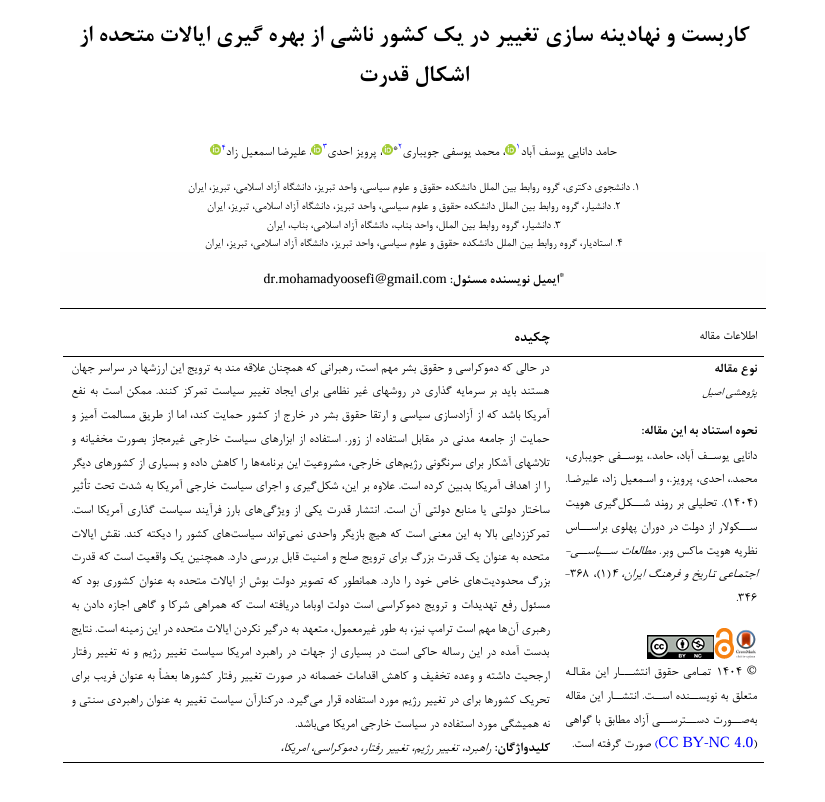Application and Institutionalization of Change in a Country Resulting from the United States’ Use of Forms of Power
Keywords:
Strategy, regime change, behavior change, democracy, AmericaAbstract
While democracy and human rights are important, leaders who remain committed to promoting these values worldwide must focus on investing in non-military methods to effect policy change. It may be in the interest of the United States to support political liberalization and the promotion of human rights abroad, but through peaceful means and the support of civil society rather than the use of force. The use of unauthorized foreign policy instruments covertly, as well as overt efforts to overthrow foreign regimes, has undermined the legitimacy of such programs and caused many other countries to become skeptical of U.S. objectives. Moreover, the formulation and implementation of U.S. foreign policy is profoundly influenced by its governmental structure and state resources. The diffusion of power is one of the most salient features of the U.S. policy-making process. High decentralization means that no single actor can dictate the country’s policies. The role of the United States as a major power in promoting peace and security is subject to examination. It is also a reality that a great power has its own specific limitations. Just as the Bush administration portrayed the United States as a country responsible for addressing threats and promoting democracy, the Obama administration realized the importance of securing the cooperation of partners and, at times, allowing them to take the lead. Trump, unusually, was committed to keeping the United States from engaging in this field. The findings of this dissertation indicate that, in many respects, U.S. strategy has favored regime change over behavioral change, and that the promise of reducing hostile actions in response to a change in behavior by other states has sometimes been used as a ruse to provoke countries into regime change. Alongside this, change policy has been employed as a traditional—though not constant—strategy in U.S. foreign policy.
Downloads
References
Ahooei, A. K. (2008). Overthrow: A Century of Regime Change Operations by the United States from Hawaii to Iraq.
Bashirieh, H. (2019). Transition to Democracy. Negah-e Moaser.
Clausewitz, K. F. (2009). On War. Army Political Ideological Organization (Cultural Deputy).
Hunger, A. V. (2007). Fundamentals of Strategic Management. Cultural Research Office Publications.
Lewellen, T., McIntire, D., Moore, A. P., & Trzeciak, R. (2012). Insider Threat Study: Illicit Cyber Activity Involving Fraud in the U.S. In. us: Financial Services Sector.
Rezaei, M. (2009). Common Theories on the Acceptance of Information and Communication Technologies. Communication Research(64).
Rosenthal, M. (2021). Insider Threats Examples: 17 Real Examples of Insider Threats. https://www.tessian.com/blog/insider-threats-types-and-real-world-examples/
Rothschild, E. (1995). What Is Security? Daedalus, 53-98.
Sabbaghian, D. A. (2007). Concepts: What is Strategy? Hamshahri Online.
Sameer Hinduja, A. U. B. K. (2013). Curtailing cyber and information security vulnerabilities through situational crime prevention. Security Journal, 383-402. https://doi.org/10.1057/sj.2013.25
Schuchter, A. (2004). Regime Change: National Security in the Age of Terrorism. iUniverse, Inc.
Schulte, G. L. (2013). Regime Change Without Military Force: Lessons from Overthrowing Milosevic. Center for Complex Operation, 4, 45-56.
Shahrabi, J. (2007). Data Mining BookCY - Tehran. Gita Data Processing Research Institute and Jihad University.
Shane, S. (2018). Russia Isn't the Only One Meddling in Elections, We Do It, Too. New York Times.
Smith, B. (2016). Donald Trump on foreign and defence policy. https://www.donaldjtrump.com/policies/foreign-policy-and-defeating-isis/PB - Commons Library Briefing
Soori, H. (2020). Scenario of the Libyan Nuclear Disarmament Model in Iran and Providing Countermeasures. Dibadokht.
Taylor, S. (1991). Should We Just Kill Saddam? Legal Time.
Tesleem, F., & Theo, T. (2017). Malicious Insider Threat Detection: A Conceptual Model. Cryptography Group, Faculty of Engineering University of Bristol, 31-41.
Timm, C. (2010). Neopatrimonialism by default: State politics and domination in Georgia after the Rose Revolution. German Institute of Global and Area Studies.
Tschirgi, D. (2007). Turning Point: The Arab World's Marginalization and International Security After 9/11. Praeger Security International. https://doi.org/10.5040/9798216027928
Unger, D. (2016). The Foreign Policy Legacy of Barack Obama. The International Spectator, 1-16. https://doi.org/10.1080/03932729.2016.1227914
Walker, C. (2018). What Is 'Sharp Power'? Journal of Democracy, 9-23. https://doi.org/10.1353/jod.2018.0041
Welt, C. (2006). Georgia's Rose Revolution: From Regime Weakness to Regime Collapse. Center for Strategic and International Studies.
Wright, B., & Douglas, H. (2005). Iraq WMD Timeline: How the Mystery Unraveled. NPR nonprofit media organization. npr.org
Zirulnick, A. (2011). Cables reveal covert US support for Syria's opposition. Christian Science Monitors.

Downloads
Published
Submitted
Revised
Accepted
Issue
Section
License
Copyright (c) 1404 Hamed Danaei Yusuf Abad (Author); Mohammad Yousefi Jouybari (Corresponding Author); Parviz Ahadi, Alireza Ismailzad (Author)

This work is licensed under a Creative Commons Attribution-NonCommercial 4.0 International License.







